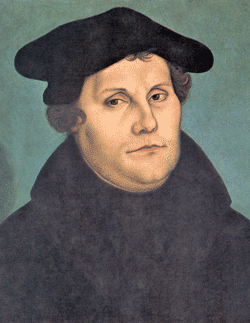

Sometimes, by design or destiny, one person changes the course of human history.
Think of Jesus Christ, Charlemagne, Joan of Arc, Michael Faraday, Queen Victoria, Gutenberg, or Jonas Salk. What fascinates is the charisma, the intelligence, the raw emotional power that one individual possesses and which transforms the world.
Today’s erudite analysis will be on Martin Luther, a modest, penniless monk who was born November 10, 1483 in Saxony in the Holy Roman Empire, now Germany. His occupation as a friar and theologian professor brought him to the thinking that reason could not lead men to God and that the selling of indulgences by the Catholic Church was contrary to God’s teachings in the Bible.
Luther received his Doctor of Theology in 1512 and was received into the senate of the theological faculty of the University of Wittenberg. He was made provincial vicar of Saxony and Thuringia by his religious order in 1515. This meant he was to visit and oversee each of 11 monasteries in his province.
How does one man decide to challenge the powerful Catholic Church, Emperor Charles V, King Henry VIII, and other notables? They had armies, and yet he defied them all with the truth as he believed it to be. His theology challenged the authority and office of the Pope. Those who came to follow Luther were called Lutherans.
It was a nail on the All Saints’ Church door in Wittenberg that began the Reformation. The date was October 31, 1517. The Reformation would beget individualism, religious freedom, better education and women’s rights. Martin Luther wrote his 95 Theses which he saw as his disputation as a scholarly objection to church practices and the tone of the writing was accordingly “searching, rather than doctrinaire.” The invention of the printing press by Gutenberg nearly 75 years earlier, helped disseminate his message throughout the known world.
Thesis 86 asks: “Why does the pope, whose wealth today is greater than the wealth of the richest Crassus build the basilica of St. Peter with the money of poor believers rather than with his own money?” Needless to say, the powerful were not amused.
Archbishop Albrecht of Mainz did not reply to Luther’s letter containing the 95 Theses. He had the theses checked for heresy and then forwarded them to Rome. He needed the revenue from the Indulgences to pay off a papal dispensation for his tenure of more than one bishopric. Luther later noted, “the pope had a finger in the pie as well because one-half was to go to the building of St. Pater’s Church in Rome.” At that time 50% of the land in Europe was owned by the Catholic Church. Luther said, “Avoid those who search for your soul with a money bag.”
Luther’s rediscovery of “Christ and His salvation” was the first of two points that became the foundation for the Reformation. His railing against the sale of indulgences was based on it. “Faith is that which brings the Holy Spirit through the merits of Christ.” Faith, for Luther, was a gift from God.
Pope Leo X warned Luther with the papal bull that he risked excommunication unless Luther recanted 41 of his 95 theses within 60 days. Luther publicly set fire to the bull in Wittenberg in 1520. Luther was excommunicated January 3, 1521 in the Papal bull Decet Romanum Pontificem.
Luther translated the Bible into the German vernacular instead of Latin and made it more accessible to the laity. His hymns influenced the development of singing in Protestant churches. His marriage to Katharina von Bora, a former nun, set a model for the proactive of clerical marriage to allow Protestant clergy to marry. They had six children.
Luther passed this life February 18, 1546 at age 62.

